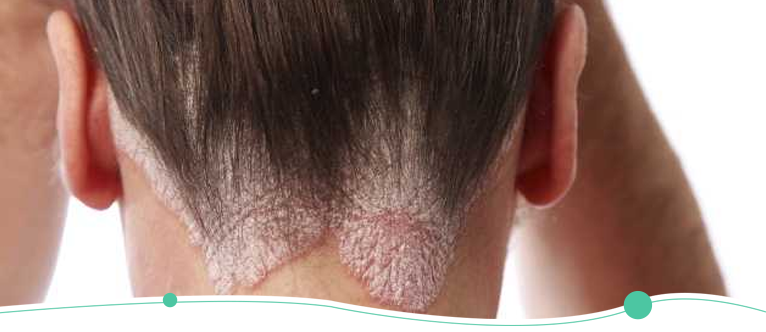
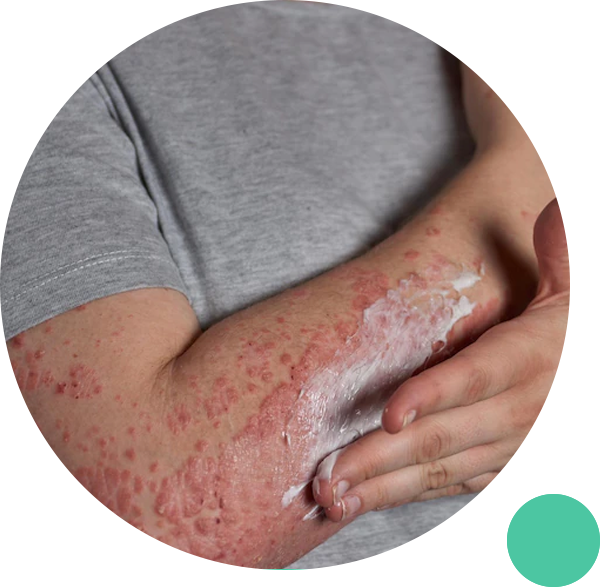
TELMDCARE
What is
Psoriasis?
Do you have psoriasis? You are not alone.
Psoriasis is one of the most common autoimmune skin diseases and affects approximately 150 million people worldwide. The condition is characterized by red patches of dry skin that can develop into patchy areas of thickened and scaly skin called plaques.
The symptoms of psoriasis are variable, ranging from mild redness to obvious itching, scaling, and bleeding. Psoriasis can affect the torso, limbs, and lower back but more often affects the scalp, elbows, knees (patella psoriasis), fingernails, toenails, and possibly the genitals (epidermodysplasia verruciformis). While its exact cause is unknown, the condition is often triggered by an infection with Group A Streptococcus bacteria.
TELMDCARE
Is covered by many popular
insurance plans

TELMDCARE
Symptoms of Psoriasis
The symptoms of psoriasis may vary from person to person, but in general, they can be divided into three categories:
Skin rash
This is the most obvious symptom and the main reason people go to online doctors for psoriasis. Itchy, red patches of skin covered with silvery scales that turn white or yellow when scratched are characteristic of psoriasis. The condition affects roughly one in four adults in the US and about one in every 12 children.
These symptoms are often worse in hot weather or after physical activity. Psoriasis is often mistaken for another skin condition, such as eczema or dermatitis, because they all have similar symptoms. However, eczema usually appears in a more generalized area, while psoriasis is typically found in only one part of the body.
Itching
The itching is usually worse at night, especially when temperatures drop below 10 degrees C. Psoriasis can also cause a dry, scaly, peeling type of skin that’s prone to cracking and bleeding easily.. In addition to itchy red patches, this symptom may cause cracking and flaking on the scalp and elbows, scaling on the scalp, and thickening and scaling on the nails (onychomycosis).
Swelling
This occurs when psoriasis starts to affect underlying tissues, such as muscles and tendons, resulting in pain and stiffness that limit normal movement. People with psoriasis may also have high fevers (103 degrees Fahrenheit or higher) due to infection or other causes. If you notice any symptoms of psoriasis, it’s important to get psoriasis treatment online from an online doctor at TelMDCare before it becomes more severe.
Treatment For Psoriasis
Psoriasis treatment is based on the severity of symptoms and the extent of your skin lesions.
Treatment For Psoriasis
Topical corticosteroids (commonly called steroids)
These medications are available by prescription in cream, ointment, gel, spray, and lotion forms.
With Psoriasis
Below are some of the health complications associated with psoriasis:
Cardiovascular problems
Psoriasis is associated with an increased risk of heart disease and stroke. This may be due to inflammation caused by psoriasis on the heart valves and arteries. Psoriatic arthritis can also lead to coronary artery disease. The risk rises with more severe cases of psoriasis.
Kidney problems
Psoriatic arthritis can cause kidney damage and chronic inflammation of the kidneys. Kidney function may be reduced in people who have had psoriasis or psoriatic arthritis for more than three years and those who smoke or drink alcohol excessively.
Rheumatoid arthritis (RA)
Psoriatic arthritis is associated with an increased risk of developing rheumatoid arthritis later in life. This can occur after the initial diagnosis has been made (prodromal phase) or later during treatment (tertiary phase). Psoriatic arthritis may also be associated with autoimmune diseases, such as lupus, thyroid disorders, and diabetes mellitus.
Mental Health Problems
In addition to joint pain, psoriasis can cause fatigue, depression, poor concentration, and low self-esteem. There is a higher incidence of depression in people with psoriasis than in those without it.
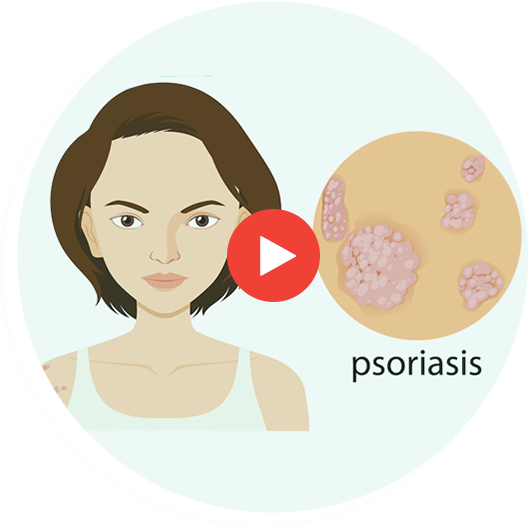
TELMDCARE
As Seen On

TELMDCARE
Causes of Psoriasis
Infections
Psoriasis is often associated with certain infections, such as herpes simplex virus (HSV) and bacterial skin infections. Sometimes, these infections cause the skin to become inflamed and red.
Autoimmune diseases
Psoriasis may be linked to other autoimmune diseases, such as lupus, rheumatoid arthritis (RA), thyroiditis, and vitiligo. Autoimmune disorders are caused by your immune system attacking healthy cells in your body. The cause of psoriasis is still unknown in many cases, but it appears that genetics play a role in developing the disease.
The most common cause of psoriasis is an autoimmune disease called psoriatic arthritis (PsA), also known as plaque psoriasis. This can cause patches of red skin to develop on the elbows and knees. PsA is caused by a faulty immune system response to a person’s cells. This triggers the body’s immune system to attack its cells, which leads to inflammation and plaque formation on the skin.
PsA affects about 1 percent of people with psoriasis, according to the National Psoriasis Foundation (NPF). There’s no cure for PsA, but psoriasis treatment online can help manage symptoms and reduce joint pain and swelling in some people.
Hormonal changes
Changes in hormones, such as those that occur during pregnancy or menopause, may contribute to psoriasis flare-ups. In addition, oral contraceptives are known to trigger outbreaks of psoriasis in some women.
Hormonal changes can also affect the production of oils in the skin (sebum). Sebum helps protect us from bacteria and fungi in our bodies, but too much sebum can result in an itchy rash with thickened patches of skin filled with excess oil.
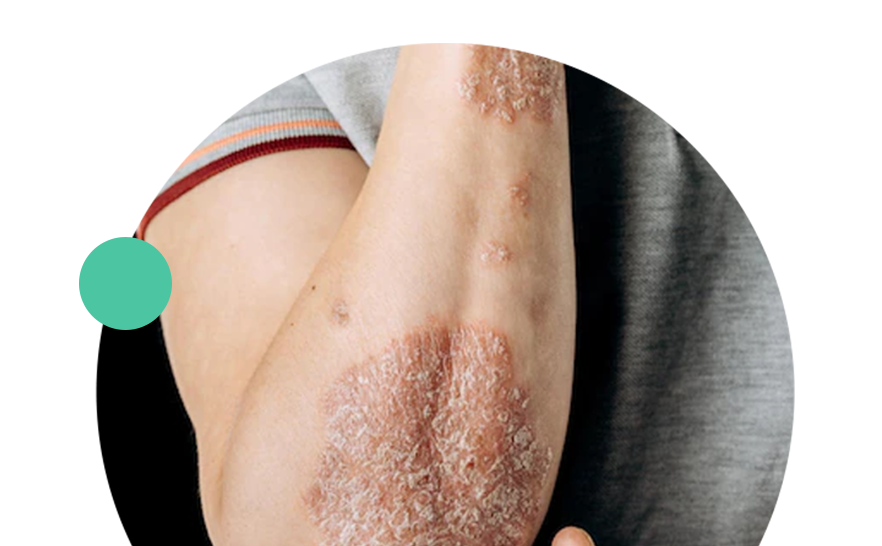
TELMDCARE
How do I know if
I have psoriasis?
The most obvious sign of psoriasis is when you have red, scaly patches on your skin. These patches often develop slowly over time and are often found on your scalp, elbows, and knees. They may also appear on your hands or feet — though this is less common.
Other signs include:
- Dry skin with cracked scales (scabs) that come off easily when scratched — this means you're scratching your skin too much!
- Your fingernails aren't growing as fast as they should be — nails can become thickened or curved due to dryness from psoriasis
- A rash that doesn't fade when you expose it to sunlight (this is called solar dermatitis) — this means you're having flare-ups in response to sunlight
Risk Factors Associated With The
Condition
Several factors can increase your risk of developing psoriasis, including:
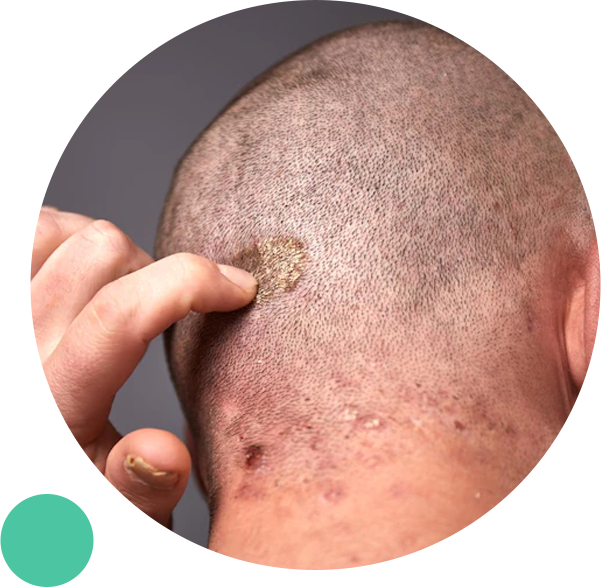
Age
Genetics
Some people inherit genes that make them more likely to develop psoriasis than others. However, it’s not clear why some people develop this condition while others do not. There are also environmental factors — such as stress or trauma — linked to psoriasis development in some individuals.
Researchers have identified genetic markers for certain types of psoriasis, but no single gene has been linked to all forms of this condition.
Gender
Dyshidrotic Eczema
Race/ethnicity
Caucasians are most often affected by psoriasis because they have lighter skin color than other races, which means they’re more susceptible to sun damage than those with darker skin tones.
Research suggests that people with fair skin usually develop lesions on their arms, legs, and scalp; those with darker skin usually develop them on their face and scalp only. People with light-colored skin often have clusters of small patches that appear on their legs or arms; those with dark-colored skin tend to develop large plaques on their faces or forearms only.

Medication services available 24/7 for adults and kids (3+)

Top quality, board-certified doctors

No insurance needed

Same-day prescriptions available*
*Prescriptions provided at doctor’s discretion.

TELMEDCARE
What we treat
We treat a variety of acute and chronic conditions and provide expert medical advice and guidance for our patients.

Seek Professional Medical Help With
Psoriasis Treatment
Online At TelMDCare
If you are experiencing severe symptoms of psoriasis, it’s important to get psoriasis treatment online immediately. The longer you wait, the more serious your condition will become.
At TelMDCare, our online doctors offer professional treatment for all types of dermatology conditions, including psoriasis.
You may sign up right now to schedule a consultation with our general practitioner for just $43. They’ll provide you with a professional diagnosis, have a conversation with you, and write you a prescription. Additionally, we offer wait-free follow-up services and substitutes for an online chat that are free.
So, what’s the hold-up? Join now and let our medical professionals assist you in leading a more comfortable, pain-free, and healthy life.
TELMDCARE
Sign Up
Our best online doctors on call ensure that the services we provide are adequate, high quality, and affordable.
Get in touch with us today for more details or Sign Up for a quick consultation.
TELMDCARE
FAQS For Psoriasis
What causes psoriasis?
Psoriasis is an autoimmune disease that causes red, scaly patches on your body’s surface. The cause of psoriasis is unknown. But the condition appears to occur when the body’s immune system attacks healthy skin cells (keratinocytes) in certain areas of the body — most often on the scalp, elbows, knees, and genitalia.
How is psoriasis diagnosed?
- Your overall health
- Family history of skin conditions like eczema or psoriasis
- Symptoms that developed before age 18



